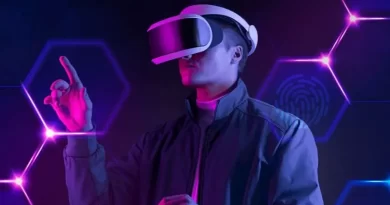Virtual Reality in Soft Skills Training: A Transformative Approach to Employee Upskilling
This article explores the transformative potential of Virtual Reality (VR) in soft skills training, providing empirical evidence and data to support its advantages. Discover how VR accelerates learning, boosts confidence, enhances emotional connection, improves focus, and becomes cost-effective at scale, revolutionizing employee upskilling in the modern workplace.
In today’s fast-paced and ever-changing business landscape, employers are facing a critical challenge: upskilling their workforce to meet the demands of a dynamic marketplace. However, the transition to remote and hybrid work models has made traditional in-person upskilling methods less feasible. In response to this dilemma, organizations are turning to the metaverse and, specifically, Virtual Reality (VR), as a powerful tool for soft skills training. This article aims to delve extensively into the numerous advantages of utilizing VR for soft skills development, providing robust data, statistics, and empirical evidence to support its efficacy.
The Potential of Virtual Reality in Soft Skills Training
As the metaverse continues to expand, the integration of VR into business strategies is gaining traction. The PwC 2022 US Metaverse Survey reports that an impressive 51% of companies are either in the process of incorporating VR into their plans or have already implemented it in at least one line of business. This highlights the growing recognition of “a more effective way to develop and train employees” as a prominent benefit acknowledged by companies.
Research on VR in Soft Skills Training
To assess the effectiveness of VR in teaching soft skills, a comprehensive study was undertaken, with a specific focus on inclusive leadership. The study involved a cohort of new managers from 12 locations across the US who received soft skills training in one of three modalities: classroom, e-learning, and VR-based learning (v-learn). The study yielded compelling evidence of the advantages of VR in soft skills development.
Top Five Findings on VR in Soft Skills Training
Accelerated Learning
The study found that employees undergoing VR courses completed their training up to four times faster than their counterparts in traditional classroom settings. Even when accounting for the additional time required for initial VR setup and familiarization, v-learners still outperformed classroom learners by three times. The accelerated learning curve in VR-enabled training ensures that employees acquire essential soft skills in a shorter time frame, allowing them to apply these skills promptly.
Enhanced Confidence
Confidence plays a pivotal role in the successful application of soft skills. VR learners exhibited higher levels of confidence in applying the skills they learned. The immersive and safe environment provided by VR simulations allowed individuals to practice difficult scenarios, resulting in an impressive 275% increase in confidence compared to classroom training and a substantial 40% improvement over e-learning. This boost in confidence translates into more competent and effective employees, capable of handling challenging situations with ease.
Emotional Connection
Emotions significantly impact memory retention and learning. VR learners reported feeling 3.75 times more emotionally connected to the training content than classroom learners and 2.3 times more connected than e-learners. The immersive nature of VR experiences allows learners to engage more deeply with the material, leading to more profound and lasting learning experiences. This emotional connection fosters a sense of empathy and understanding, vital for soft skills like communication and leadership.
Improved Focus
In an age of ubiquitous distractions, maintaining focus during training is a challenge. VR learning demonstrated remarkable focus compared to e-learning. Immersive VR experiences captured learners’ attention, eliminating interruptions and multitasking tendencies. VR-trained employees exhibited 1.5 times more focus than their classroom-trained peers and an astounding four times more than e-learning participants. This heightened focus ensures that employees derive maximum benefit from their training, leading to better skill retention and application.
Cost-effectiveness at Scale
While VR training initially requires a higher investment than traditional methods, its cost-effectiveness improves as the number of learners increases. The study revealed that when delivered to 375 learners, VR training achieved cost parity with classroom learning. At 3,000 learners, VR training became an impressive 52% more cost-effective than classroom training. This scalability of VR-based training ensures that organizations can efficiently train a large number of employees at reduced costs while maintaining training quality.
Integration of VR in Blended Learning Curriculums
While VR is not intended to replace traditional training methods, its integration into blended learning curriculums is highly recommended. VR can complement classroom and e-learning approaches, providing a more immersive and engaging learning experience for employees. As the metaverse continues to grow and remote work becomes the new norm, businesses are increasingly exploring the use of VR for onboarding and training, creating a comprehensive and adaptable learning environment.
Real-world Applications
For example, a VR soft skills course was developed to help executives and staff practice new sales approaches. Learners engage in a virtual pitch to a CEO, and their performance determines whether they receive a “virtual contract” based on their demonstration of value to the company. Such interactive experiences help learners build confidence and better apply skills on the job.
Virtual Reality is revolutionizing the landscape of employee upskilling, particularly in soft skills training. The empirical evidence presented in this article demonstrates that VR can accelerate learning, boost confidence, enhance emotional connection, and improve focus. Moreover, the cost-effectiveness of VR training at scale makes it an attractive option for businesses seeking to develop and train their workforce in a rapidly changing world. Embracing VR within blended learning curriculums can unlock new potential for organizations, allowing them to navigate the metaverse and meet the demands of the future.




